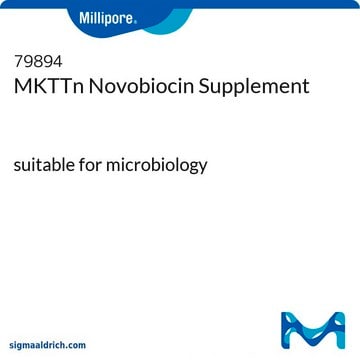SBR00025
Novobiocin Ready Made Solution
100 mg/mL in water
Synonym(s):
Novobiocin Ready Made Solution
About This Item
Recommended Products
biological source
microbial
Assay
≥90%
form
liquid
concentration
100 mg/mL in water
color
faint yellow to dark brown
antibiotic activity spectrum
Gram-negative bacteria
Gram-positive bacteria
mycobacteria
neoplastics
Mode of action
DNA synthesis | interferes
enzyme | inhibits
storage temp.
−20°C
Related Categories
General description
Application
- in cell culture systems to treat mycoplasma contaminations.[3]
- in a research to where it has exhibited anti-cancer effects by inhibition of Hsp90 (heat shock protein)[4],[5]
Biochem/physiol Actions
Activity spectrum: Active against gram-positive and gram-negative bacteria
Features and Benefits
- Ready available solution reduce the need for preparation time
- Commonly used in Cell Biology and Biochemical applications
- High quality antibiotic suitable for mulitple research applications
Preparation Note
Other Notes
Signal Word
Warning
Hazard Statements
Precautionary Statements
Hazard Classifications
Skin Sens. 1
Storage Class Code
12 - Non Combustible Liquids
WGK
WGK 1
Choose from one of the most recent versions:
Certificates of Analysis (COA)
Don't see the Right Version?
If you require a particular version, you can look up a specific certificate by the Lot or Batch number.
Already Own This Product?
Find documentation for the products that you have recently purchased in the Document Library.
Related Content
Discover cancer research resources with modeling and profiling tools for cell culture, genomics, biomarkers, and more to help maximize your cancer research.
Our team of scientists has experience in all areas of research including Life Science, Material Science, Chemical Synthesis, Chromatography, Analytical and many others.
Contact Technical Service






